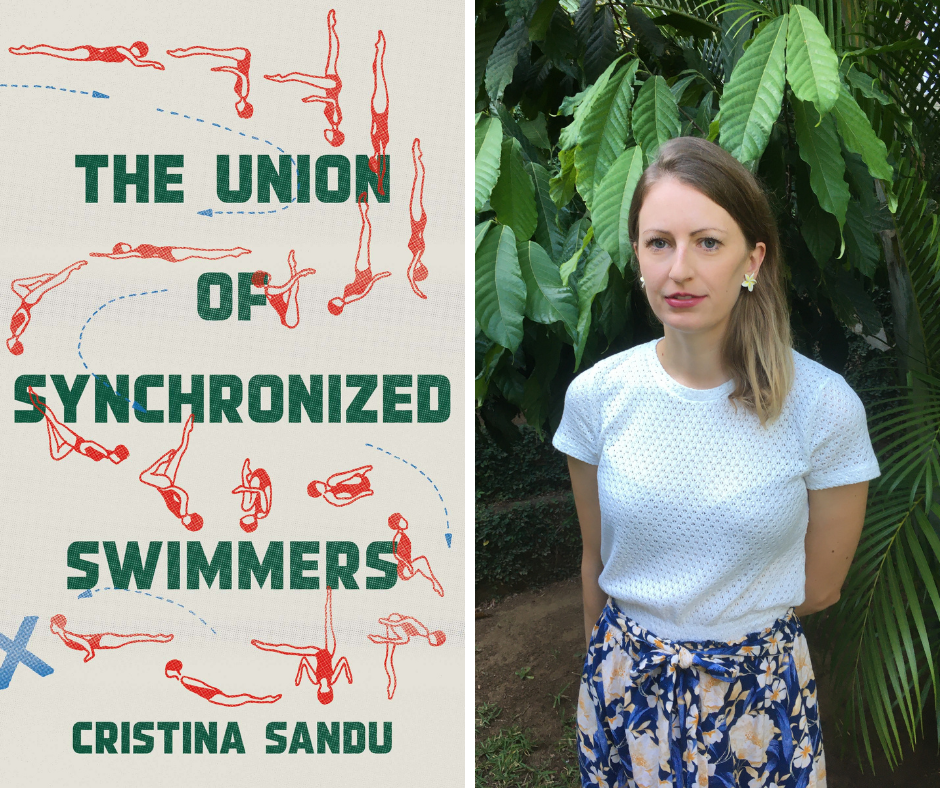Happy Publication Day to The Union of Synchronized Swimmers by Cristina Sandu

Happy Publication Day to The Union of Synchronized Swimmers, by Finnish-Romanian author Cristina Sandu, translated from the Finnish by Cristina Sandu! We’re delighted to share this book with you, which won the 2020 Toisinkoinen Literary Prize in its native Finland, a literary award given for the best second novel.
The Union of Synchronized Swimmers follows six girls behind the Iron Curtain who meet each day to swim. At first, they play, but as summer draws to an end, the game becomes something more. They hone their bodies relentlessly; they barter cigarettes stolen from the factory where they work for swimsuits to stretch over their sunburnt skin; they master holding their breath underwater. One day, their visas arrive, but can what’s waiting on the other side of the river satisfy their longing for a different kind of life?
“Cristina Sandu’s spare and sparkling prose is intimate and visceral,” writes Lindsay Zier-Vogel, author of the forthcoming Letters to Amelia. “A deeply moving story about six women who dare to dream bigger than their muddy river, whose lives splinter from their tight synchronized formations into an unflinching, often unforgiving world. An exquisite and powerful read.” The Toisinkoinen Literary Prize jury calls The Union of Synchronized Swimmers “[s]killfully crafted and defined, airy, and multi-layered.”
Originally published in Finnish, Sandu translated The Union of Synchronized Swimmers into English (one of the many languages she speaks fluently). We’re starting to see more examples of authors translating their books, including Jhumpa Lahiri, who translated her latest novel, Whereabouts, into English after being written and published in Italian. The Union of Synchronized Swimmers will also be released in the UK and US in August from Scribe.
In anticipation of the book’s English language release, Sandu recorded a video to introduce her novel to Canadian readers. We hope you enjoy!
We also chatted with Sandu, an avid reader, about some of her favourite books, and about the particulars of her writing practice.
B*H: What are you currently writing?
CS: I’m working on a novel about the first Danish immigrants in Nicaragua.
B*H: What are you currently reading?
CS: The Dangers of Smoking in Bed by Mariana Enriquez, translated by Megan McDowell.
B*H: What book—or books—would you recommend to a new friend?
CS: A Horse Walks into a Bar by David Grossman, The Years by Annie Ernaux and Trout, Belly Up by Rodrigo Fuentes.
B*H: What book—or books—would you recommend to an old friend?
CS: Kiss of the Spider Woman by Manuel Puig.
B*H: What book coming out this season can you not wait to read?
CS: The English translation of Federico Falco’s short story collection Un cementerio perfecto, in English A Perfect Cemetery, translated by Jennifer Croft and published by Charco Press.
B*H: Who, where, when, and what influences your writing?
CS: More than anything else great books and movies. Also new encounters and discussions with people who are passionate about something, whether literature, music, languages, anything…
B*H: What does and doesn’t help you write?
CS: I need movement—a long train trip, or a walk during which I can think about writing. Too much noise and anxiety make writing impossible.
B*H: What do you write with?
CS: I use a notebook to draft and solve problems I have with the text. I use the computer once I know what to say and where the story is going.
B*H: What makes you happy?
CS: Discovering new places, making new friends. Finding an exciting author to read.
B*H: How did you know that your most recently written book was finished?
CS: Once I let it sit for a while and got back to it, I felt satisfied and didn’t know what to change. Now I of course have plenty of edits in mind, but I think a book is never really finished, only as good as possible with the skills one has at the moment.
B*H: Do you have a preference for fiction, nonfiction, or poetry in your reading or writing?
CS: I find it easiest and most enjoyable to read fiction. But lately I’ve expanded my reading into nonfiction as well—I love This Little Art by Kate Briggs and On Immunity by Eula Biss, for example (I’m a huge fan of Fitzcarraldo books). When it comes to poetry, I admire it but feel it often surpasses my understanding. I mostly enjoy poetry books which can be read as one story: Ilya Kaminsky’s Dancing in Odessa is one of my favourite books. I would never try to write poetry but I wish that some day I find a personal style in essay writing.
B*H: Tell us your favourite word, and why it’s your favourite.
CS: I recently learned a word in Miskito, Tininiska. It means hummingbird. I just think this word describes perfectly the flying of a hummingbird: so swift and delicate and beautiful.
❧
The Union of Synchronized Swimmers, the latest title in our Literature in Translation Series, is available now from our online shop, or from your local independent bookstore. Congratulations, Cristina!
Cristina Sandu was born in 1989 in Helsinki to a Finnish-Romanian family who loved books. She studied literature at the University of Helsinki and the University of Edinburgh, and speaks six languages. She currently lives in the UK and works as a full-time writer. Her debut novel, The Whale Called Goliath (2017), was nominated for the Finlandia Prize, the most prestigious literary prize in Finland. The Union of Synchronized Swimmers, which won the 2020 Toisinkoinen Literary Prize, is her first book to be published in English.

